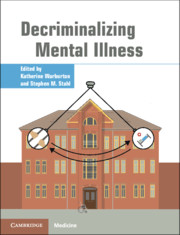Book contents
- Decriminalizing Mental Illness
- Decriminalizing Mental Illness
- Copyright page
- Contents
- Contributors
- Part I Introduction/Description of the Problem
- Chapter 1 Balancing the Pendulum: Rethinking the Role of Institutionalization in the Treatment of Serious Mental Illness
- Chapter 2 Deinstitutionalization and Other Factors in the Criminalization of Persons with Serious Mental Illness and How it is Being Addressed
- Chapter 3 A Brief History of the Criminalization of Mental Illness
- Chapter 4 A Social History of Psychotic Illness
- Chapter 5 Forensic Patients in State Psychiatric Hospitals: 1999–2016
- Chapter 6 A Survey of National Trends in Psychiatric Patients Found Incompetent to Stand Trial: Reasons for the Reinstitutionalization of People with Serious Mental Illness in the United States
- Chapter 7 Forensic Psychiatry and Mental Health in Australia: An Overview
- Chapter 8 Community Forensic Psychiatric Services in England and Wales
- Chapter 9 A Longitudinal Description of Incompetent to Stand Trial Admissions to a State Hospital
- Part II Solutions
- Part III Psychopharmacological Treatment Considerations
- Part IV Nonpsychopharmacological Treatment Considerations
- Part V Criminal Justice and Social Considerations
- Index
- References
Chapter 3 - A Brief History of the Criminalization of Mental Illness
from Part I - Introduction/Description of the Problem
Published online by Cambridge University Press: 19 October 2021
- Decriminalizing Mental Illness
- Decriminalizing Mental Illness
- Copyright page
- Contents
- Contributors
- Part I Introduction/Description of the Problem
- Chapter 1 Balancing the Pendulum: Rethinking the Role of Institutionalization in the Treatment of Serious Mental Illness
- Chapter 2 Deinstitutionalization and Other Factors in the Criminalization of Persons with Serious Mental Illness and How it is Being Addressed
- Chapter 3 A Brief History of the Criminalization of Mental Illness
- Chapter 4 A Social History of Psychotic Illness
- Chapter 5 Forensic Patients in State Psychiatric Hospitals: 1999–2016
- Chapter 6 A Survey of National Trends in Psychiatric Patients Found Incompetent to Stand Trial: Reasons for the Reinstitutionalization of People with Serious Mental Illness in the United States
- Chapter 7 Forensic Psychiatry and Mental Health in Australia: An Overview
- Chapter 8 Community Forensic Psychiatric Services in England and Wales
- Chapter 9 A Longitudinal Description of Incompetent to Stand Trial Admissions to a State Hospital
- Part II Solutions
- Part III Psychopharmacological Treatment Considerations
- Part IV Nonpsychopharmacological Treatment Considerations
- Part V Criminal Justice and Social Considerations
- Index
- References
Summary
For a very long time, mental illness was viewed not as a disease, but as a manifestation of evil spirits. Confusion and apprehension have been the legacy view of mental illness, even as far back as ancient Greece. In 380 B.C., Socrates wrote in The Republic that “The offspring of the inferior…will be put away in some mysterious, unknown place, as they should be.” During the middle ages, an obsession with evil in the form of witches became prominent. The official practice guidelines for detecting evil and witches, the Malleus Maleficarum (1486), assisted inquisitors in finding evil lurking amidst women, the socially disenfranchised and those suffering from mental illness. In 1494, theologian Sebastian Brant wrote The Ship of Fools, which detailed the phenomenon of sending away persons with mental illness aboard cargo ships through the canals of Europe and overseas.
- Type
- Chapter
- Information
- Decriminalizing Mental Illness , pp. 14 - 29Publisher: Cambridge University PressPrint publication year: 2021

